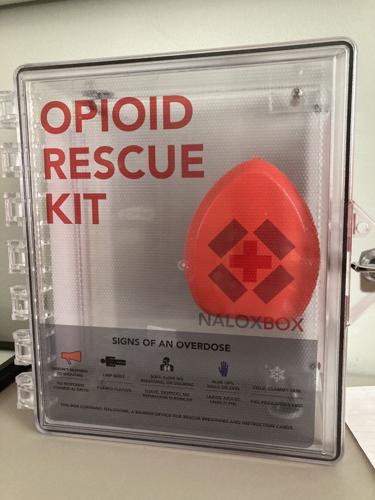On the heels of the number of opioid overdoses falling 24% in Manchester in 2024, and a 21% decrease in fatal overdoses year over year, city health officials are asking aldermen for approval to use opioid settlement funds to continue prevention efforts into next year. Manchester Health Director Anna Thomas has a request before the aldermanic Committee on Community Improvement this week to extend the use of her department’s originally approved opioid abatement funding request into the first four months of FY 2026, and approval to $111,915 in additional opioid abatement funding to continue the work of the city’s Rapid Overdose Assessment and Response (ROAR) team through June 2026 — operating under a newly defined scope of work. In addition to overdoses falling 24% in Manchester in 2024, Thomas said so far this year there were only 30 suspected overdoses during the month of January, and only 25 in February — the lowest monthly occurrence since April of 2020.
“During the height of the epidemic, Manchester was experiencing an average of close to 75 suspected overdoses per month,” Thomas wrote in a memo to aldermen. To counter a rise in overdoses post-pandemic, the Manchester Health Department secured funding and technical expertise from the Centers for Disease Control and Prevention (CDC) in 2022 which led to the development of the “2024 City of Manchester Overdose Prevention Strategy: An Investment Guide for Sustainable Local Impact.” The department also hosted national site visits, community meetings and professional development training, and used some of the funding to hire a director of overdose prevention and a dozen per diem overdose prevention outreach workers to respond to overdose spikes at the neighborhood level.

When the CDC grant ended, Manchester aldermen in April 2024 unanimously approved funding for the director of overdose prevention and 10 per diem overdose prevention outreach worker positions with local opioid abatement funds — money from legal settlements connected to the opioid crisis — through June of 2025. “This ROAR team continues to be highly successful in reducing overdoses throughout the city and saving lives,” Thomas wrote. In planning the department’s FY’25 budget, Thomas said she and staff did not expect the CDC and National Association of County and City Health Officials (NACCHO) would allow the city to carry over unspent funds from the previous year.
“We were advised, after the start of FY’25, that they would allow us to do so. As a result, we have been able to utilize these funds into this fiscal year, thus requiring less of the earmarked opioid abatement funds,” Thomas wrote. Now that “considerable gains have been made in preventing overdoses to date,” Thomas said she and her staff plan to reengineer the scope of the ROAR team and the director of overdose prevention away from overdose response to an emphasis on treatment and recovery through the summer of 2025, including eliminating harm reduction interventions directly related to IV drug use (outside of the distribution of life-saving Naloxone).
The proposed timeline for reengineering the scope of the ROAR team and director of overdose prevention is as follows: • Transition harm reduction interventions directly related to IV drug use to existing syringe service programs by June 30 (outside of the distribution of life-saving Naloxone). • Convene community partners including staff from Hope Connections to map out and define outreach efforts and a referral system by July 1, 2025. • Develop and present to the city’s Special Committee on Alcohol, Other Drugs and Youth Services a new model of service delivery for the team with a focus on treatment and recovery by Aug.
1. • Request that the Special Committee on Alcohol, Other Drugs and Youth Services hold a hearing in October 2025 to ensure that the above criteria are met. • Reevaluate community trends, the project cycle and performance measures of the team by June of 2026.
To date, with approval from aldermen, the ROAR team has completed a total of 7,462 overdose prevention outreach contacts (4,889 contacts during early morning and 2,573 contacts during evening), while distributing more than 3,000 overdose prevention kits that included Naloxone and fentanyl test strips. “The strength of embedding the Director of Overdose Prevention and ROAR team within a local health department has been the leveraging of resources, technical expertise and accountability to those we serve,” Thomas wrote in her request..
Health

City health dept. looks to extend OD prevention work to June 2026

On the heels of the number of opioid overdoses falling 24% in Manchester in 2024, and a 21% decrease in fatal overdoses year over year, city health officials are asking aldermen for approval to use opioid settlement funds to continue...















